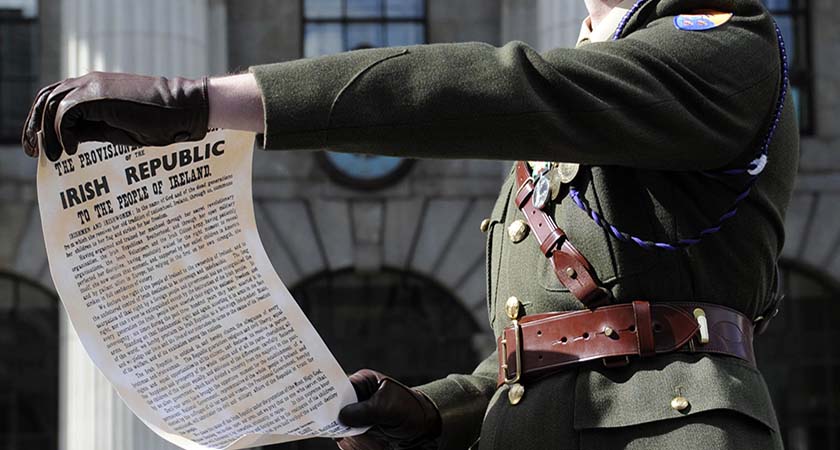ANYONE for the 32 counties? All of a sudden we are all Ireland or hard borders.
Out of nowhere, well, out of Brexit, things that nobody was talking about anymore are suddenly all the rage. Micheál Martin, Enda Kenny, they’re all at it.
Now some of this is just due to summer and its political hiatus, but the uncertainty surrounding Brexit has no doubt fuelled it.
It’s odd. I can honestly say that in the seventeen years I have been living here I have heard no ordinary person, nobody in the pub, nobody in the workplace, nobody at the school gates, even mention a united Ireland.
So do we want it? Is anyone even bothered? Of course we all know our history and when it comes to a united Ireland it is hard to discuss that without recourse to the lives that have been shed for it.
That includes those who shed their lives for a political ideal, for the dream of nationhood, those who so fervently believed in the rights of Irish nationality that they sacrificed themselves in the hope of achieving it.
It also includes those who got in the way of a united Ireland and, sadly, that does not just include what might be called enemy combatants, soldiers and policeman, but innocent children and workers and pub-goers. They all died for a united Ireland too.
Fittingly enough though, in the centenary of 1916, it does give us the chance to reflect upon the whole idea of nationhood.
The rebels of 1916 were acting inside the constraints of a global British empire that was denying their very assertion of who they were. In that way establishing the nation became a true stab at fundamental freedoms, whatever the eventual make-up of the Irish State.
In the context of 1916 the creation of the Irish nation made sense. The thing is though that this is now 2016 and the world has radically changed. Not only do we have the realisation that throwing off British control has not, one hundred years on, meant Irish control, but we also realise that the whole idea of nationhood has changed.
Firstly, we know that being our own masters does not mean, especially in this globalised world, that we do not have other masters too.
Anyone know who controls the Irish economy in 2016? The Troika? The IMF? The EU? Google? Facebook? It’s not just us anyway, is it? Secondly, the idea of the nation has changed too.
Whereas nationalism might have once been an urge to overthrow unjust, imposed power, it doesn’t look the same in 2016. The urge to wrap the green flag around you doesn’t look quite as attractive taking into account those who wrapped themselves in the Union Jack during the Brexit vote, or those who wrap themselves in the stars and stripes now and want to build a wall around the US, and that is all without going into the extremes of nationalism that marred the last century.
Nationalism now is just a little bit ugly, isn’t it? And what about the North? What would we do about all of those singing and dancing Northern Ireland fans who are clearly in love with their own country?
What happens to them when we have 32 counties? Of course, there will be those who talk about the brave men and women who died for the idea of a united Ireland and there is something in that.
Many of those people in our history were brave idealists who put our current national leaders to shame. James Connolly, for instance, was noble by any meaning of the word.
In truth, though, we are going to have to get past that. We cannot have a cult of the dead that always leaves us in the shadow of what those who went before us wanted. I’m fairly sure a 2016 James Connolly would now have other issues on his mind than the establishment of a 32 county state.
Justice and fairness are not now tied up with the idea of the nation. I wonder, in fact, if there is a globalised Irish generation, European in outlook, international in life, who are even the slightest bit bothered about a united Ireland.
Of course, stranger things have happened and a united Ireland might happen, but it might actually be quite telling that the idea of it is now being bandied about in what is traditionally known in media circles as ‘silly season’.
So, anyone for the 32 counties? I wonder.


